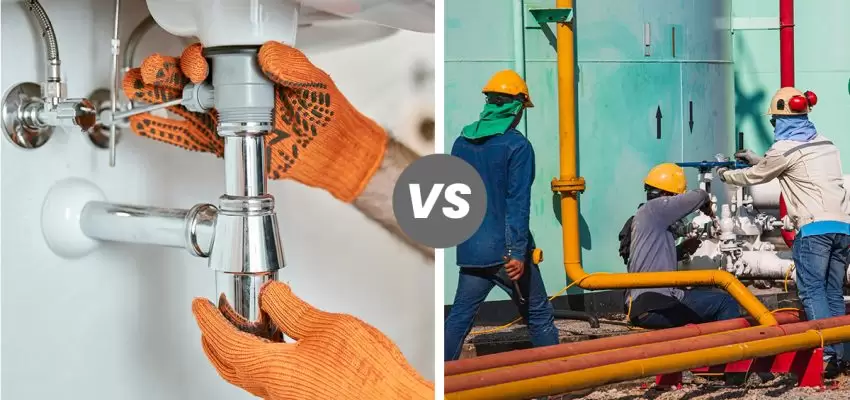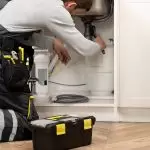Plumbing is a critical service that ensures the functionality of a space yet two key professions associated with it are often confused: plumbers and plumbing contractors. While both are important for the execution and maintenance of a plumbing system, their key responsibilities, training, and scope of work can differ significantly.
Post your Requirement
The Role of Plumbing Contractors
Plumbing Contractors are often involved in larger-scale projects that provide a managerial role. They run their plumbing businesses and oversee a team of plumbers to handle complex installations and construction projects. Contractors are responsible for planning and coordinating all aspects of a particular plumbing project, ensuring its smooth completion.
Key Responsibilities:
- Project Management: Contractors plan and manage plumbing projects from execution to completion. This may include tasks like scheduling, and coordinating considering the provided timeline.
- Hiring and Supervision: They hire skilled plumbers and provide them with the necessary supervision to ensure that all tasks are performed safely.
- Contract Negotiation: Contractors are the upfront negotiators for every project. They are also responsible for preparing bids and managing the budget to ensure profitability in new projects.
- Compliance and Permits: They are responsible for obtaining necessary permits and making sure that all work complies with local codes and rules.
- Client Relations: Plumbing contractors maintain relationships with clients, architects, and other subcontractors to acquire new projects.
The Role of Plumbers:
Plumbers, on the other hand, are professionals responsible for installing, repairing, and maintaining plumbing systems. From fixing leaky faucets and unclogging drains to installing new pipes in homes and commercial buildings, plumbers have many tasks to tend to. Plumbers either specialize in residential or commercial plumbing, though some can be proficient in both.
Key Responsibilities:
- Installation: Plumbers install pipes, fixtures, and appliances such as sinks, toilets, and water heaters.
- Repair and Maintenance: They diagnose and repair plumbing issues, including leaks, blockages, and malfunctioning fixtures.
- Compliance: Plumbers ensure all work meets local plumbing codes and safety standards, which requires a thorough understanding of relevant regulations.
- Customer Service: Direct Interaction with clients to explain issues and provide estimates.
The Key Difference between Plumbers and Plumbing Contractors
While both plumbers and plumbing contractors share similar knowledge of plumbing systems, their roles are significantly different. Plumbers are typically more focused on hands-on technical work, whereas plumbing contractors are involved in broader aspects of business operations.
- Plumbers focus on installation, repair, and maintenance. Contractors handle larger projects and manage teams.
- Plumbers require technical skills and problem-solving abilities. Contractors need additional skills to execute a certain project such as Business operations, project management, client relations, networking, and regulatory compliance.
- Plumbers are responsible for specific tasks within a project. Contractors oversee entire projects and ensure all elements are completed successfully.
Equipment and Technology:
Whether it’s a plumber fixing a simple leak or a plumbing contractor overseeing the installation of a complex system, having the appropriate equipment is important for efficiency. Plumbers rely on a variety of hand tools, power tools, and diagnostic equipment to perform their jobs effectively. These tools are designed to handle the intricate and often challenging part of plumbing work, from installation to maintenance.
Equipment Used by Plumbers:
Hand Tools:
- Pipe Wrenches: The iconic tool of the plumber, pipe wrenches come in various sizes and are used for gripping and turning pipes.
- Pipe Cutters: These tools make clean cuts through pipes of different materials, including copper, PVC, and steel.
- Plunger’s Tape: Also known as Teflon tape, it is used to seal pipe threads and prevent leaks.
Power Tools:
- Drill: Used for creating holes in various materials, essential for installing plumbing fixtures and running pipes through walls.
- Reciprocating saw: Useful for cutting through pipes and other materials quickly and efficiently.
- Pipe Threader: This tool is used specifically to create threads on the ends of pipes, allowing them to be screwed into fittings and couplings.
Diagnostic Tools:
- Pipe Cameras: These cameras are used to inspect the interior of pipes and identify if there are any blockages, leaks, or damage without invasive digging.
- Pressure Gauges: These devices measure the water pressure within a system to diagnose issues and ensure proper functioning.
- Leak Detectors: Tools that use sound, pressure, or thermal imaging to locate leaks in pipes.
Advanced Equipment Used by Plumbing Contractors:
Plumbing contractors, who often manage larger and more complex projects, require advanced equipment that goes beyond the typical tools used by plumbers.
Heavy Machinery:
- Excavators: Used for digging trenches and large holes required for laying underground pipes and sewer systems.
- Backhoes: Versatile machines for digging and moving large amounts of earth, crucial for many construction projects.
- Trenchers: Specialized equipment for creating narrow trenches for laying pipes.
Specialized Tools:
- Hydraulic Pipe Benders: These are used to bend pipes to specific angles without compromising their integrity, essential for custom installations.
- Pipe Freezing Kits: Allow for temporary freezing of water in a section of pipe, enabling repairs or modifications without shutting off the entire system.
- Fusion Machines: Used for joining plastic pipes through heat fusion, ensuring strong and leak-proof connections.
Making the right choice: Hiring Plumbers or Plumbing contractors?
When faced with a plumbing issue or new installation, knowing whether to hire a plumber or plumbing contractor can be crucial to the success of the project. Assess the scope and nature of your project, whether there are small-scale repairs or large-scale projects, and evaluate the cost considerations. After considering all the factors, making the final decision comes down to balancing your needs, budget, and the specific requirements of your project.























Post A Comment